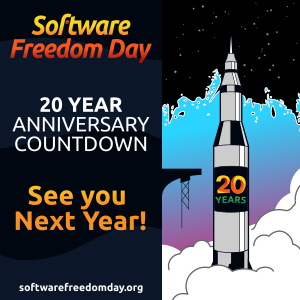
New Year's Day is always a good time to reflect back of the previous year and look ahead to the new one. Last year, for example, I would have predicted that strong new versions of the main Linux distros would have accelerated the adoption of Linux in businesses. This process is going a lot more slowly than I thought it would, but on the other hand, there is enough demand that Microsoft is now in the business of selling Linux to the corporate world, something I never thought I'd see.
So having established my so-so credentials, here are my Fearless Predictions for 2007:
1. OLPC XO launches, and 5 million Linux desktops and e-book readers are put in the hands of students in the developing world. Textbooks in e-book format will follow in country after country-- it's difficult to see how this cannot do to printed textbooks what digital music files are doing to the CD.
2. The Evergreen Open Source ILS continues to pick up new customers/sponsors (and momentum) in the library world. The rapid progress of this project is amazing, and a tribute to the open source model, as well as the bright people behind it.
3. Meanwhile, the Koha Open Source ILS continues to add features, and LibLime's slick packaging approach shows what needs to be done to market this terrific program. A safe prediction: More libraries will discover Koha is 2007.
4. With most proprietary ILS products in the hands of private equity groups (including the recent announcement about SirsiDynix being acquired), and with reduced competition because of recent mergers, ILS vendors will face pressure to raise prices to enhance profitability for their new owners. I think that in conjunction with trends 2 and 3 above, this will cause more libraries to consider open source alternatives at upgrade time.
5. Libraries continue to add online discovery tools (like Aquabrowser, Endeca, and Encore) in an attempt to meet the expectations of patrons accustomed to slicker search methods elsewhere. Eventually, the primitive opacs we all know and (don't) love may be thought of as a staff only function. This can't happen soon enough, IMHO.
6. The continued rapid spread of read-write culture (and thinking back, I had barely heard of YouTube a year ago). The industrial revolution brought us mass "read-only" culture-- books and records produced by the million, broadcast spectra controlled by radio and TV networks, and a film industry dominated by just a few big companies. This century so far is bringing us a far more democratic and decentralized type of mass culture driven by the web and drastic decreases in production costs for content. Libraries struggle sometimes to get everything on best seller lists, but what if instead of the top 40 albums there are 400 or 4000? As the culture gets reconsidered, so must our ideas of collection development.
7. As a result of trend 6, and the rise of the remix and mashup culture, copylefted and open sourced content will spread. As shown by what I suppose will be known as the pioneering months of YouTube, there is an amazing burst of creativity wherever lawyers and digital restrictions aren't. The tensions around this issue will only get worse as the disconnect grows between the technology-driven present-day reality and laws and institutions rooted in the past. In the end, the digitally restricted world will probably decline in importance as culture moves elsewhere. Good for libraries, of course, because it makes sharing so much easier!
8. Desktop Linux continues to spread. Vendors like Novell and Canonical have great desktop Linux products, and Microsoft's Windows Vista presents schools and businesses everywhere with difficult and expensive upgrade decisions. I'll say it again this year, we should see a few key, leading-edge migrations to Linux on the desktop.
9. My New Year's resolution is to not leave posts in "save as draft" limbo-- my optimistic prediction is more posts on Space Age Librarian!

10. Again this year, no flying cars or robot maids with lace aprons, and certainly no seamless interoperability!



4 comments:
Seamless interoperability? It's getting worse.
Yup, I'm thinking the flying cars and robot maids will get here sooner.
As for SirsiDynix charging us more!! We pay a ridiculous amount here in Australia as it is!
These prices seem ridiculous in the USA, too.
When the Ann Arbor District Library in Michigan decided to create their own open source discovery tool instead of buying Innovative Interfaces' "Encore" tool, they joked that with the money saved they'd buy a Lexus.
I think it's getting obvious that the model we've developed for creating and maintaining library automation products is becoming unsustainable.
Post a Comment